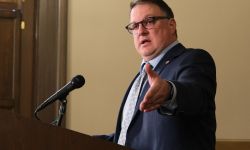Preschoolers, older college students win in Whitmer education budget

Universal pre-K for children in Michigan’s neediest school districts.
Free college and job training for adults.
And a shrug for public universities.
Gov. Gretchen Whitmer unveiled an almost $16 billion school aid budget Thursday that her administration says would be the biggest boost in K-12 and higher education spending in 20 years.
The proposed budget, a 4.9 percent increase over this year’s education spending, represents the Democratic governor’s wish list. The priorities of the Republican-controlled state Legislature could be different. In 2019, the schools budget eventually passed by the Legislature and signed by Whitmer in September bore only slight resemblance to the proposals made by the governor last February.
- Related: Gretchen Whitmer wants to bring back scaled-down Pure Michigan campaign
- Related: Michigan Gov. Gretchen Whitmer’s health budget is heavy on prevention
Still, the proposals offer a view of Whitmer’s priorities as she pushes to improve the state’s struggling public schools and its universities.
Here are some of the winners and losers in her proposal:
Universal pre-K high for high-poverty schools
Whitmer proposes a $42 million expansion of the Great Start Readiness Program, the state-funded preschool program for 4-year-olds from low- and moderate-income families.
That expansion would be centered on 26 high-poverty, low-performing school districts. Eligible school districts have less than a quarter of their third-graders rated as proficient on the M-STEP English language arts assessment, and at least 75 percent of students are identified as economically disadvantaged.
Test scores are often stubbornly correlated to poverty. As Bridge reported, recent data by the Michigan Department of Education showed that GSRP led to improved third-grade reading scores.
Children could attend full-day preschool for free in those districts, without any income eligibility caps.
26 Michigan school districts would receive universal pre-K
Michigan Gov. Gretchen Whitmer proposed what amounts to universal pre-K in high-poverty, low-performing districts through expansion of the Great Start Readiness Program, which serves 4-year-olds from low- and moderate-income families. These are the districts:
- Detroit Public Schools Community District
- Flint City School District
- Pontiac City School District
- Eastpointe Community Schools
- Benton Harbor Area Schools
- Saginaw Public School District
- Hamtramck Public Schools
- Muskegon Public Schools
- Battle Creek Public Schools
- Dearborn Heights School District
- Mount Clemens Community Schools
- Clintondale Community Schools
- Oak Park Public Schools
- Westwood Community School District
- River Rouge School District
- Ecorse Public Schools
- Harrison Community Schools
- Godfrey-Lee Public Schools
- Beecher Community Schools
- Bridgeport-Spaulding Community Schools
- Eau Claire Public Schools
- Westwood Heights Schools
- Madison District Public Schools
- Genesee School District
- Burr Oak Community School District
- Hartford Public Schools
The biggest winner would be the Detroit Public Schools Community District, which would be eligible to receive up to $16 million to offer GSRP to 1,919 additional students. The districts range from urban communities such as Flint and Pontiac, to rural communities like Harrison Community Schools north of Clare.
The expansion would add about 5,000 more children to a preschool program that now serves about 37,000 four-year-olds, at a current cost of $250 million.
Detroit Mayor Mike Duggan has advocated for universal free pre-K for Detroit families for more than a year.
While the term “universal pre-K” isn’t written in the budget proposal, that’s essentially what Whitmer’s proposal entails. All 4-year-olds who live within the boundaries of those 26 school districts would be eligible to attend taxpayer-funded, full-day preschool. The funding set aside for each community is the state’s estimate of children who are not already enrolled in GSRP or federally-funded Head Start.
The budget also calls for an increase in state per-pupil funding for those 4-year-olds in GSRP to match the level of funding for K-12 students. That’s an additional cost of $35.5 million.
The proposal received a warm reception from a key Republican, Rep. Aaron Miller of Sturgis, who chairs the school aid appropriations subcommittee.
“I’m in favor of it because you save so many dollars down the road,” Miller said Thursday. “You’re catching the problems early.
“We have a literacy issue in this state,” Miller said. “The more we can attack these problems early on, the better.”
Sen. Rosemary Bayer, D-Beverly Hills, who serves on the Senate K-12 appropriations committee, said she is a “huge fan” of pre-K education, and considers the governor’s budget a welcome step toward universal, free preschool.
Free college and job training for older, adult students
The budget includes $35 million to launch Reconnect, a program offering free tuition for students over age 25 to receive a post-high-school credential, certificate or associate’s degree.
Reconnect is modeled after a successful program in Tennessee, which uses free tuition as a way to get adults, many of whom have some college credits, back onto campus.
Whitmer’s administration sees Reconnect as a key to increasing the percent of adults with post-high school credentials. Whitmer set a goal when she took office in 2019 to have 60 percent of adults with some kind of post-secondary credential by 2030.
Income generally increases with education. On average nationally, people with a bachelor’s degree earn $900,000 more over their lifetimes than people with a high school diploma.
Michigan ranks 21st in the nation in high school graduation rate, but 34th in the the percent of adults with a bachelor’s degree or higher.
But no free college for traditional students
In last year’s budget, Whitmer proposed free community college and $5,000 toward tuition at a four-year university for recent high school grads. That effort, called the Michigan Opportunity Scholarship, didn’t receive traction in the Republican-controlled Legislature.
Whitmer didn’t include the proposal in the 2020-21 budget, giving up on pushing for free college for this year. Several leading Democratic candidates for president have made free college part of their platform.
School lunch forgiveness
Whitmer proposes $1 million to forgive the school lunch debt of students.
School lunch debt has increased in recent years, according to the School Nutrition Association of Michigan, with the average district carrying about $3,000 in unpaid school lunch debt annually.
School lunch debt has made national headlines recently, with some children being denied lunch because they owe debt, and individuals and businesses stepping up to pay off the total debt for schools.
Schools can apply for grants to pay off their students’ lunch debts if they commit to a still-being-developed school lunch debt anti-shaming policy.
Student loan refinance
Whitmer proposed spending $10 million to create a Michigan Student Loan Refinance Program to allow borrowers to refinance up to $50,000 in student loans through the state at a lower interest rate.
Michigan residents owe $47 billion in student loan debt. The average Michigan college graduate in 2018 who took out student loans left campus with about $32,000 in debt.
The program will be open to individuals with federal and nonfederal student loans used to pay expenses at a Michigan institution of higher education, who have resided in Michigan for at least 12 months, and have been making regular payments on those loans for at least three years.
The Whitmer budget documents didn’t specify what the loan rate offered by the state would be. The $10 million would provide seed money for the rotating loan fund.
Modest rise in K-12 per-student funding
The governor recommended a modest increase of $225 per student in state funding for schools receiving the minimum per-student funding this year. That would be an increase of 2.8 percent, and bring per-student funding to $8,336 in the 2020-21 school year.
That’s less than the 3 percent increase schools received this year. The gap between schools receiving the minimum per-student funding and maximum would decrease to $343.
But increased cash for some students
Whitmer’s budget is conservative in across-the-board per-pupil funding as the governor continues to try to move to a “weighted” formula, that provides more money to students with greater needs.
The budget proposes $125 million total in new money for students who are economically disadvantaged, English-language learners or who are in special education.
Several education coalitions have released reports advocating for a weighted formula in school funding, similar to formulas used in leading education states including Massachusetts and Minnesota.
The proposals are a small step. For example, the governor’s budget proposal calls for an additional $60 million to support economically disadvantaged students. That seems like a big number, but there were 760,219 economically disadvantaged students in Michigan’s public schools in 2018-19. That $60 million would mean an extra $78.92 per low-income student.
Chipping in for teacher classroom supplies
Many teachers buy their own classroom supplies. Whitmer’s budget includes $25 million — capped at $250 per teacher — to reimburse their out-of-pocket expenses. That proposal was cheered by Paula Herbert, president of the Michigan Education Association, the state’s largest teacher union.
“When we fully fund our schools, we won’t need to worry about buying paper, pencils, highlighters and books on our own,” Herbert said. “But until that day comes … we’re excited to hear her plan to … to help defray the out-of-pocket costs being spent on basic classroom supplies.”
A shrug of the shoulders for public universities
Whitmer proposed a 2.5 percent boost for the state’s 15 public universities, an increase Michigan Association of State Universities CEO Dan Hurley greeted with a sigh.
“We are appreciative of what is an above-inflation budget recommendation,” Hurley said. “But it’s not as high as we had hoped.”
Hurley said he hoped Whitmer would hold out for that 2.5 percent increase in negotiations with Republican legislative leaders. Last year, Whitmer proposed a 3 percent increase for public universities, but in the final budget, universities received 0.5 percent.
“And these are the good economic times,” Hurley said.
“I think this is a good education budget,” said GOP Rep. Miller. “We are putting the money where it counts, where we're going to see results, and that's a great thing that doesn't need to be a partisan statement.”
Bridge reporter Jonathan Oosting contributed to this report
Michigan Education Watch
Michigan Education Watch is made possible by generous financial support from:
Subscribe to Michigan Education Watch
See what new members are saying about why they donated to Bridge Michigan:
- “In order for this information to be accurate and unbiased it must be underwritten by its readers, not by special interests.” - Larry S.
- “Not many other media sources report on the topics Bridge does.” - Susan B.
- “Your journalism is outstanding and rare these days.” - Mark S.
If you want to ensure the future of nonpartisan, nonprofit Michigan journalism, please become a member today. You, too, will be asked why you donated and maybe we'll feature your quote next time!






